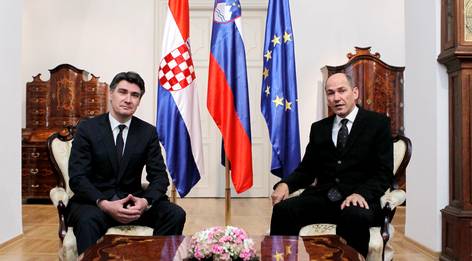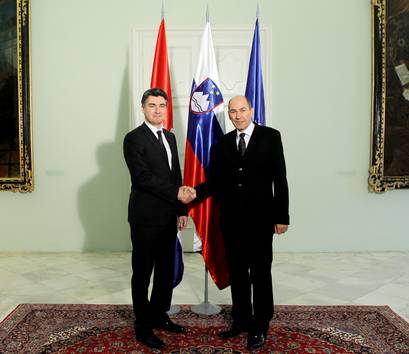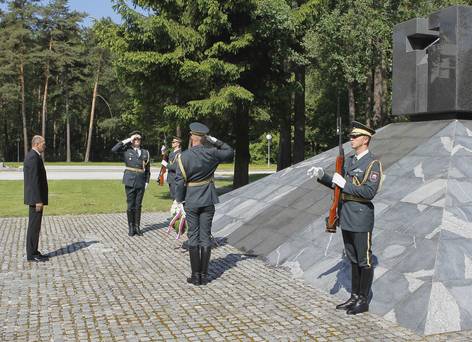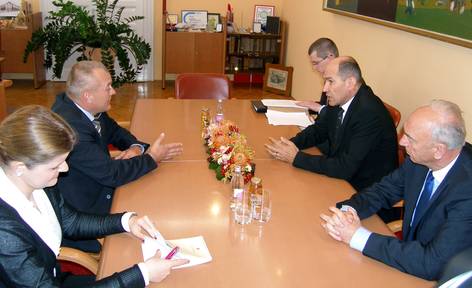NEWS
Slovenian and Croatian Governments honour commitments signed and see opportunities for development cooperation in the EU
The Prime Minister of the Republic of Slovenia, Janez Janša, today had a working meeting with the President of the Republic of Croatia, Zoran Milanović. On the occasion of the official visit, Prime Minister Janša paid his respects to the victims of post-war violence in Tezno, Maribor, by laying a wreath in Maribor's Dobrava cemetery in the morning. In memory of the victims, wreaths were also laid by senior representatives of the Croatian Government: President Ivo Josipović, Prime Minister Zoran Milanović and the President of the Parliament of Croatia, Boris Šprem. In a joint statement to the press after the working meeting, both prime ministers confirmed that bilateral relations were good; they pointed out they shared a common will, and that opportunities existed in terms of development and Croatia's accession to the EU.
Prime Minister Janša underlined that Croatia is currently Slovenia's fifth most important economic partner and that trade in goods had recently exceeded EUR 2 billion, despite the economic crisis. Prime Minister Janša added that, upon the Croatia's accession to the EU, the possibilities of cooperation in the utilisation of cohesion funds would also be broadened. According to the Slovenian Prime Minister, the most promising areas of cooperation between the two countries lie particularly in infrastructure projects, the energy industry and environmental protection.
In this respect, Prime Minister Janša underlined that the commitments made by the former Government and the Slovenian National Assembly regarding the resolution of the state border issue and other matters would be respected by both countries. He also touched on the joint committee that would be responsible for dealing with development matters and other issues of common interest. The Croatian Prime Minister also stressed that there were no thorny unresolved issues between the countries, that relations between the two countries were good, and that any eventual technical issues would be resolved by the joint committee, which is expected to meet before the summer.
With regard to the issue of the former Ljubljanska banka branch, the Slovenian and Croatian prime ministers made assurances that, in this respect, everything remained as agreed when Croatia had closed negotiation chapters for EU accession, Chapter 4, and that the commitments made would be respected. In this respect, the Slovenian Prime Minister added that both governments were committed to respecting what had been ensured, signed and negotiated during the course of democratic procedures. The Croatian Prime Minister also pointed out that there might be some misunderstanding with regard to the Ljubljanska banka issue "since the commitments made by Croatia, as a condition for concluding certain chapters in the EU accession negotiation process, which were carried out by the former Government simply bind us, irrespective of whether they are useful for Croatia or not".
With regard to Croatia's endeavours to join the EU, the Slovenian Prime Minister said that "it is in Slovenia's strategic interest that the EU enlarges to include Croatia and other areas and countries in the Western Balkans. This provides further support to the EU strategy for this part of Europe". In his opinion, difficulties are not expected to arise with regard to the ratification of the Croatian Accession Treaty with the EU in the National Assembly; according to the Slovenian Prime Minister, the procedure could expect to be implemented, in compliance with the time limit expected, by the beginning of the second half of next year.
The Croatian Prime Minister is optimistic about the Croatian perspective in the EU. He said that the EU was a common area in which perspectives for cooperation and development existed. He underlined that Slovenia and Croatia were familiar with each other's advantages and disadvantages, that both countries had learned a great deal from the past, that they both faced new challenges ahead, and they have both tried to adapt to the crisis as best as possible.
Faced with a question from the press on the success of the Slovenian Government's first 100 days of its term of office, the Slovenian Prime Minister responded that it had been a success, that changes have occurred in the mentality of the people, and that there had been success with regard to the signing of starting points for a new social contract, which Slovenia required for its new development steps, where the Fiscal Balance Act presented the first step to be taken.
On the margins of the working meeting with the Croatian Prime Minister, the Slovenian Prime Minister also met the Mayor of Maribor, Franc Kangler. The Mayor brought the Prime Minister up to speed with the situation in the Municipality of Maribor, the denationalisation and cost-cutting measures taken and development plans adopted. The Mayor and Prime Minister also focused their talks on the measures taken by the Government, which were supported by the Mayor, since this year and next the Municipality of Maribor is also dealing with the streamlining of certain enterprises and institutions, the merging of institutions and, as a result, a reduction in the number of employees.











